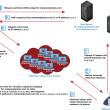Story of a Facebook message that’s Actually a Phishing Scam – Opening ‘Wat are u Doing in This Video’ isn’t what You supposed to Do
Now this can be termed as the new wave of phishing scams on Facebook. A message has been circulating via Facebook’s personal messaging system, which appears to be sent by a friend.
The message’s tagline is pretty interesting and attention grabbing as it says: ‘Wat are u Doing in This Video?’
It appears as if the friend is making fun of what you are seen doing in the video he has just watched.
Moving on, the message requests you to visit a web link, search for your name and then get connected to the specified location where the video is available.
It becomes obvious from the tone of this message that the video contains something embarrassing or compromising, and you Need to watch it.”
Example:
“Hey Frank, wat are you doing in this video? Wow! Skip to 1:53 omg.. who posted this? Type in and search ur name at www .xyz-abc. com
Reality Bites:
Don’t worry about it at all if you are also one of the recipients because it is just another phishing scam.
It is true that the message was sent from your friend’s account on Facebook but your friend isn’t the real sender. It happened so because your friend’s account has been stolen.
When you visit the specified web page, a fake Facebook page will be displayed on your browser claiming that to continue, you need to enter your original Facebook login details, that is, email Id and password.
After this is done, you will be directed to a Facebook app page. It will ask for your permission for an app that will access your account on Facebook.
While this is happening, hackers will collect your login details.
This information will be used to hijack your Facebook account and you will not be able to access it then.
Hijackers will use this account information to conduct more scams like this one posing as you.
Wondering what is the role of the app in this feat? Well after it has been installed, it will send the same message to your friends… all of them!
Since you will be the sender of the message therefore, it is highly likely that some of your friends will fall prey and resultantly their accounts will also be hijacked.
Dangerous Obsession:
The same ruse was used by scammers back in 2014. The reason why scammers prefer this mechanism is because it stimulates an extremely common natural instinct, that is, curiosity or panic. The message’s title will compel many individuals to follow the instructions and get their accounts hacked.
If you receive this kind of a message please avoid clicking on the given link or else you will be tricked! Follow @HackRead











